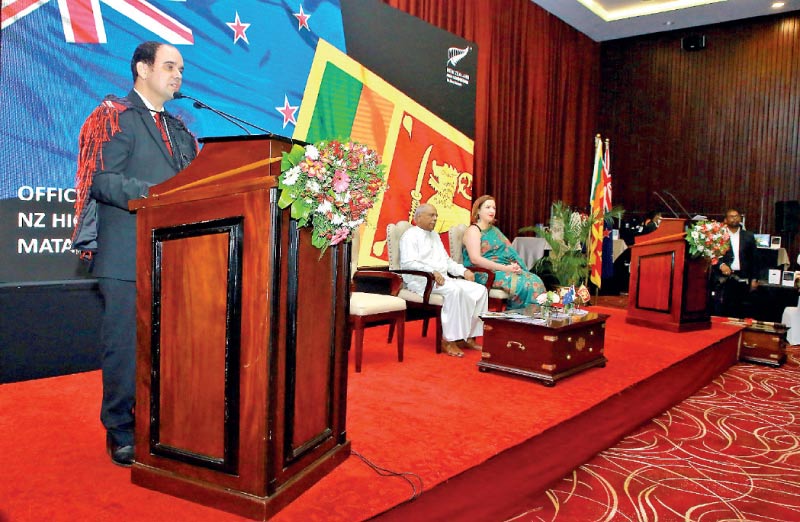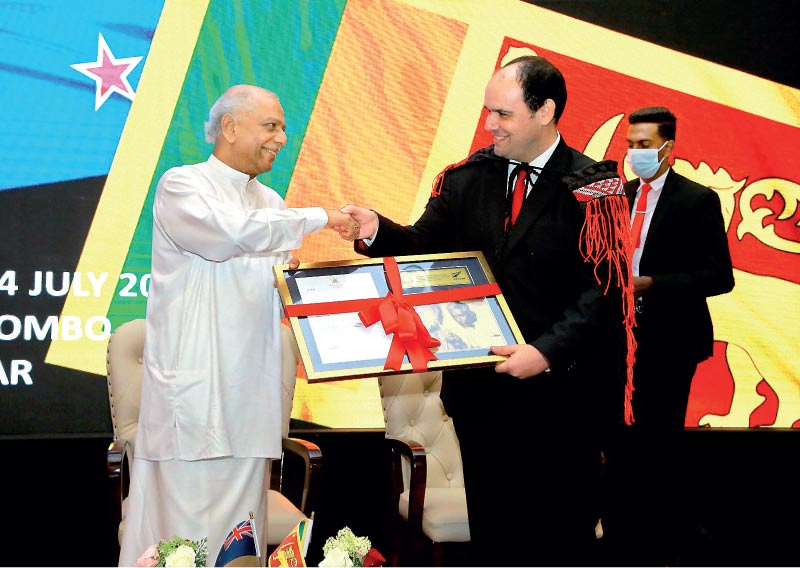Tuesday Feb 24, 2026
Tuesday Feb 24, 2026
Monday, 17 July 2023 03:29 - - {{hitsCtrl.values.hits}}


Prime Minister Dinesh Gunawardena on Friday said that opening of a resident diplomatic Mission of New Zealand in Colombo demonstrates that both sides recognise the importance of furthering cooperation in practical and meaningful ways.
Speaking at the official opening of the New Zealand High Commission in Sri Lanka – being commemorated on the occasion of Matariki or Māori New Year, he said this step will assist in forging stronger links between the two countries across all spheres, focusing primarily on advancing economic, trade, and investment partnership.
Pointing out that Sri Lanka and New Zealand are the oldest democracies in Asia and Pacific and both countries have enjoyed universal franchise since 1931, the Prime Minister thanked New Zealand for assisting to set up a Dental College in Maharagama in 1951 and the National Milk Board in 1956.
The first few batches of nurses were trained in New Zealand. The IOH has produced nearly 1,000 qualified nurses (967) and 345 of them are currently in services. The IOH has conducted school dental clinics in 443 schools across the country, he said.
The Prime Minister urged New Zealand to further collaborate to upgrade the OHI by providing dental expertise and educational affiliations with New Zealand Dental Universities.
High Commissioner Michael Appleton said opening of the resident mission is a chance for the two countries to take their close relations to the next level.
“Our Matariki holiday is about unity, renewal, celebration, hope, and new beginning. It provides New Zealanders a chance to pause, reflect and look optimistically to the future,” Appleton said in his speech at the event.
“In the spirit of Matariki, I would like to wish Sri Lankans, and indeed the Sri Lanka-New Zealand relationship, unity, hope and a new beginning.”
The event also featured Ngati Koraha, a Māori kapa haka group with performances reflective of the culture of New Zealand’s indigenous people. Appleton said New Zealand, as a long-standing friend, had sought to assist Sri Lanka in its time of need. “At the height of the crisis last year, we provided humanitarian assistance targeting malnourished children and struggling farmers,” he said.
“More recently, we have been focused on providing niche technical assistance in policy areas where we have expertise and where Sri Lankan authorities are seeking to make reform, such as on public financial management, governance, and diversity in political representation.”
Appleton added that just as Sri Lanka and Sri Lankans had sought to adapt to the economic crisis, so had New Zealand tried to tailor its approach here. “As Sri Lanka seeks to write a new chapter in its history, the New Zealand-Sri Lanka relationship is also adapting, renewing, moving in different directions. “In coming years, as Sri Lanka seeks to adapt, improve and reform in response to the crisis, New Zealand will be here in Colombo – a steady, friendly partner, looking for new ways to cooperate that benefit our two peoples, whether in commerce, education, tourism, sport, security, foreign policy or via our respective diasporas.” Ministers, MPs and diplomats and senior officials attended the event.